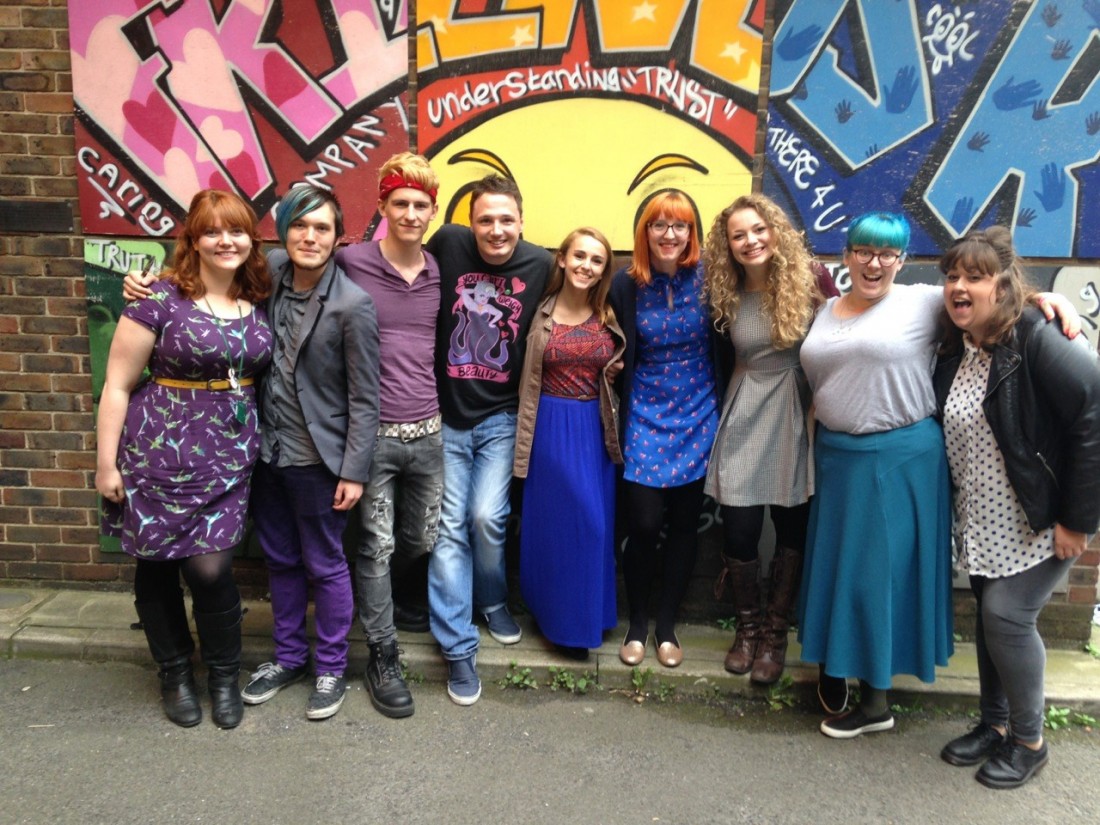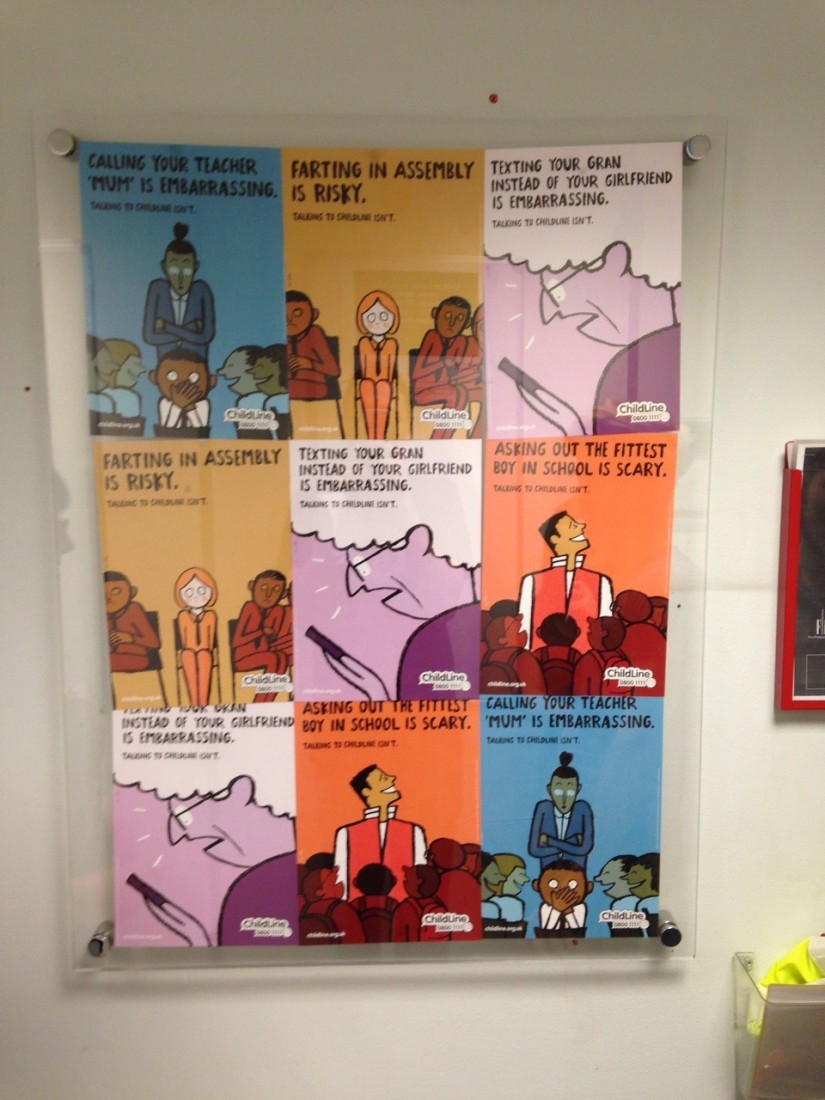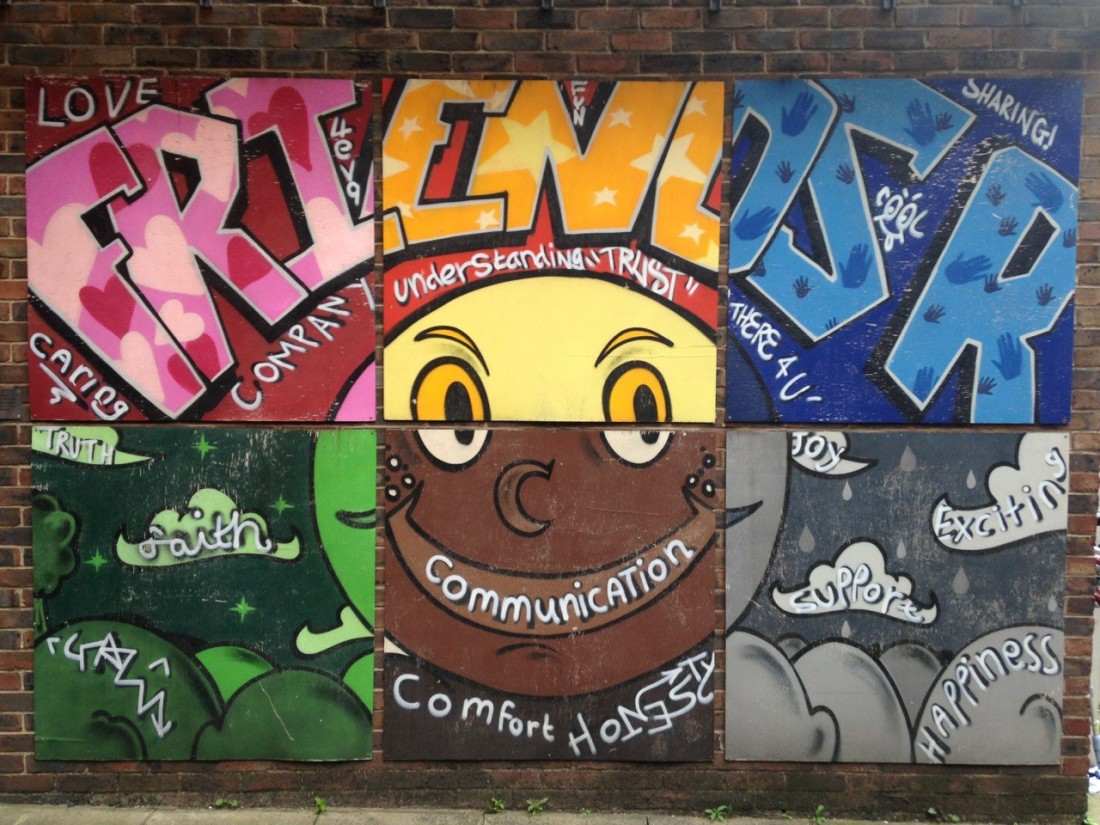Having an audience on YouTube is often praised for being different to the sort of relationship pop stars, actors or celebrities have with their fans. It’s far more personal and often interactive. YouTubers reach out, they talk about the issues they’ve faced and overcome, and often are more than happy to share advice.
In many ways the YouTube community serves as a support network for a variety of young people with a variety of problems. Whether it’s confidence issues, bullying, sexuality, loneliness or relationship difficulties, the young people within our community reach out to those they look up to yearning for guidance.
This is not part of the content creator job description, but most take it on and take it very seriously. But even those who choose not to respond to the Tumblr asks or YouTube comments most certainly still receive these messages.
Sometimes the issues could be considered small. Other times scarily big: eating disorders, emotional and sexual abuse, self-harm and suicidal thoughts. How should YouTubers respond to these sorts of messages? How do they know the advice they are giving is the right advice? And what do you do if you get hundreds of these messages every single day?
TenEighty took Carrie Hope Fletcher, George Long, Hannah Witton, and Gary C to the ChildLine offices in Shoreditch, London to seek advice and discuss these topics further.
“I did a video with the Department of Health about two years ago,” says Carrie. “I opened up to my audience and told them to think of me as their honorary big sister. Just by saying that sentence my inbox is constantly streaming full of messages.
“I emptied my inbox yesterday and I’ve got 468 messages in there by this morning,” she reveals.
Carrie, much like the other YouTubers attending this meeting, receives hundreds of messages from young people reaching out for advice. She mostly receives messages about social anxiety, depression and self-harm which she finds particularly troubling.
“When someone’s at the point where they’re self-harming you know that whatever you say is going to make an impact. And you don’t know which way it’s going to go,” she says. “I feel bad if I leave that question. If all they need is someone to answer them, if all they need is to know that somebody is there and I haven’t replied because I’m scared to, it’s just going to make it worse.”
“ You can put quite a lot of pressure on yourself in these scenarios, feeling like you have to be that person for them. ”
Gary C receives similar messages, but notes he has seen a dramatic change over the last two years in the types of issues he’s dealing with. Previously most of his messages were concerning changing schools, friendship problems and relationship issues but he’s seen a worrying increase in high-risk situations.
“Unfortunately it’s now getting to the case where you have a combination of needing to be heard or seen along with these mental health issues,” he says.
“One girl recently took a picture of herself with R.I.P. and then her name, and she messaged me saying unless I messaged her back or rang her on Skype she would kill herself,” reveals Gary.
“Obviously this was my worst case. I said to her in a very long email that it was unfair and I tried to be as softly-softly as I could be. She emailed me the next day and apologised and said she was going to go to a GP. Which is all that I advised her to do,” he continues.
Suffering from panic attacks, anxiety and depression himself, Gary theorises that the change in messages he receives might have something to do with the content he currently makes. His recent output has had a focus on self-help topics such as self-esteem and loneliness.
“ You can talk to a ChildLine counsellor about anything. ”
Hannah hasn’t had as extreme cases as Gary, but finds she is often dealing with confidence and depression issues too, which she finds difficult. “I find it really hard to answer those ones because I don’t feel like I can relate,” she says.
“I’ve never suffered from depression and I’m very lucky that I’ve always been a very confident person,” she explains. “So when people ask me how to be confident I think, ‘I don’t know, I just am’.
“My main thing is ‘fake it ’til you make it’, which can be difficult. Because then you have to make a proactive step to pretend to be a confident person,” she adds.
George reveals that the messages he receives are quite different from the others. “I think part of it is because I’m a man, and most of my viewership are female, so I don’t think they’re going to turn to me,” he says. “I do actually get a lot to do with bullying.
“I had one recently where someone had been ditched by all her friends and all of a sudden they were saying that they hate her and she didn’t know what to do,” he says.
“ There’s no such thing as an issue that isn’t serious enough. ”
We met with Hannah Flynn, Amy Jones and Holly Smith who work in ChildLine’s Communications team. “You can put quite a lot of pressure on yourself in these scenarios, feeling like you have to be that person for them,” says Holly.
“We’ve spoken to people in the past who say they’ve got messages about certain issues and it took them months to work up the courage to reply, because they just didn’t know what to say,” she continues. “Months wasn’t really the ideal amount of time, but then again it wasn’t exactly that person’s responsibility.”
ChildLine is a free confidential service in the UK that anyone under the age of 19 can use. It’s available online and by phone and operates 24 hours a day. Emphasising that the scale of the issue doesn’t matter, Hannah Flynn tells us more about the service.
“You can talk to a ChildLine counsellor about anything. Some people haven’t quite found that bit out,” she explains. “A lot of the time people think, ‘oh I wouldn’t contact ChildLine because my issue isn’t serious enough,’ but there’s no such thing as an issue that isn’t serious enough. Even if you’ve just had a bad day and you need to tell someone about it.”
Amy reminds us that the service is confidential, and explains more about what that means. “It doesn’t show up on phone bills, we give you advice on how to cover your tracks and you don’t have to say who you are,” she says. “A lot of the time people will say their first name and they’ll ask for the counsellors name too, but you don’t have to.”
“ Statements like ‘it’s OK’ and ‘it’ll be fine’ can gloss over the problem. ”
We open with a discussion about bandaging statements. When giving advice to others most people are inclined to say ‘you’ll be alright,’ or ‘it’s going to be OK,’ but ChildLine believe statements like this can be unhelpful.
“I agree with ChildLine because I find ‘you’ll be fine’ very dismissive,” says Gary. “And I have had people respond to it dismissively, like ‘what do you mean I’ll be fine?’
“It can placate people sometimes,” he continues. “If it’s someone like Carrie saying ‘you’ll be fine’, they can absorb that and it’s a positive and nourishing message. I often say ‘be kind to yourself’ instead though, because I feel it’s more effective.”
“It’s kind of like saying ‘just wait it out’,” says Hannah Witton, “which a lot of people don’t need, they need action and help.”
Using Dan Savage’s It Gets Better campaign, Holly explains why ChildLine refrain from using bandaging statements. “’It Gets Better’ is the kind of statement ChildLine would never make because for some young people it doesn’t. In many cases it may have to get worse before it gets better,” she says.
“In situations where we’re trying to encourage a young person to tell somebody that they’re being abused, what might happen afterwards is that they or their parents may be removed from their home situation. And in their eyes that would be much worse than getting better. It’s the start of a long path,” explains Holly.
“Statements like ‘it’s OK’ and ‘it’ll be fine’ can gloss over the problem,” she adds.
“ We’re here to listen. We’re here to support and encourage. ”
With services like ChildLine existing, it’s interesting that a lot of young people choose to reach out to YouTubers for help. Hannah Witton theorises that this may be because young people aren’t aware of the services available. “I’ve always reached out to my audience and said I’m here to help,” she explains. “So when you offer that to them they will take it up.
“It makes me quite sad to think they don’t have anyone in their real life who they can talk to about these things,” she continues. “I understand though that it’s quite good getting it from an outsider, because often friends may know the people involved in a particular situation. If it’s someone completely removed then it sometimes feels safer.”
George finds it flattering, but strange that people would choose to come to him. “In my videos I think I portray a bit of a character; I’m very sassy and blunt,” he explains. “I think I come across as not a very nice person, so why would people choose to come to me for help?”
“They’ll go to someone who they admire or like because they don’t want to burden people in their real life,” interjects Gary. “I do that. Specifically when I was in therapy. I had many close friends that I would never go to because I felt like a burden to them.”
The idea of being a burden strikes a chord, and allows Amy to highlight one of ChildLine’s biggest attributes. “We’re here to listen. We’re here to support and encourage. We’re not here to fix problems, we can’t do that, but we can help make a plan,” she says.
“And that’s the difference between ChildLine and your ask boxes,” Amy explains. “We can carry on the dialogue with them. We can say ‘What’s going on? Who’s involved? What do you want to happen? How do you think you can get there? Who else could you tell about this?’ It’s very much a child led service.”
“But you guys can’t edge into that because then you’d end up responding to 50 emails from just one young person,” she continues. “And that’s a massive responsibility for one individual.”
While ChildLine is something YouTubers could and should refer people towards, there is a concern that this in itself may come across dismissive. As Gary mentioned, people reach out to those who they admire. Carrie explains that she wouldn’t want someone in need to feel like she’s responded with an automated message.
“Linking them straight to ChildLine feels like a very dismissive solution when they have specifically come to me,” she says. “I want to make it known that it is coming from me, it’s coming from a good place and they have come to the right place. But then again, there’s only so much I can do.”
“ Our confidentiality is higher than that of the emergency services, teachers or GPs. ”
Hannah Flynn suggests that it doesn’t have to be as cold as referring it directly on to ChildLine, but more making young people aware that it is a service available to them. “It has to feel natural to your own YouTube practice,” she explains.
“Hopefully the young people you speak to don’t need to feel palmed off to the service, because it’s a service that you’ve encountered and when you recommend us it’s because you believe in us,” Hannah adds.
Acknowledging this, Gary enquires the best line of action in a high-risk scenario and what ChildLine can actually do.
“We would recommend you referring them to us. State that you’re not trained to give them the kind of support they need, and that they should contact someone who is,” says Hannah Flynn. “What we would then do is work with the person to get them support, rather than just do it against their wishes.
“We had 300,000 contacts last year and about 1,800 of those we had to do what we call a breach. And that’s for very serious imminent issues,” she explains. “So someone who has a suicide plan, someone who is abusing other young people or being abused by someone who is in a position of power. Most of the time we would breach them to the police or an ambulance, very rarely child services.
“We would only ever breach our confidentiality promise in the most serious of cases and we always talk through it in the call,” she adds. “Our confidentiality is higher than that of the emergency services, teachers or GPs.”
“ I didn’t realise just how how much demand for this service there is. ”
Confidentiality is something that is really important at ChildLine. When a young person calls they don’t have to reveal their name, the call doesn’t show up on the phone bill and it’s not recorded at the other end. When people reach out via the ChildLine website you do have to sign up for an account, but it isn’t linked to an email or any social media accounts.
We are given a tour of the ChildLine offices, and allowed to see the main call centre where counsellors take calls, the majority of whom are volunteers. During the tour Gary is moved to tears.
“I didn’t realise just how how much demand for this service there is,” he says. “Being an adult I obviously refer people to the Samaritans and Mind, but I didn’t know how many children are reaching out for help.”
“ The worst thing that’s happened to you is still the worst thing that’s happened to you. Your pain is your pain. ”
Expressing how helpful the trip has been for her, Carrie tells us how ChildLine can often be the punch-line of a joke. “Me and my cousin hung out a lot when I was younger. At the time she might’ve jokingly punched me and I would’ve responded ‘oh I’m gonna call ChildLine’,” she says. “It was an empty threat.
“I’ve come here today and seen all the things you actually do. I’m definitely going to make sure people know that’s not just an empty threat,” Carrie continues. “You don’t just throw it out there as a stupid thing to say to someone who’s annoyed you. You actually use it because that’s what it’s there for.”
As our meeting comes to a close, Holly leaves us with something she hopes we can emphasise about ChildLine’s services. “It doesn’t matter how serious your issue is. It could be you’ve fallen out with your friends, or your stressed because of your exam, or because your parent has died,” she says.
“Outwardly people see those as completely different issues. But the worst thing that’s happened to you is still the worst thing that’s happened to you,” Holly explains. “Your pain is your pain.”

(L-R: Amy Jones, Teoh Lander-Boyce, George Long, Gary C, Hannah Witton, Holly Smith, Carrie Fletcher, Hannah Flynn, Mia Jones)
TenEighty caught up with Hannah, Carrie, George and Gary a couple of months after our trip to reflect on their experience at ChildLine, what they learned and to find out if, and how, it’s helped.
Hannah enjoyed her trip to the offices. “It was really insightful to the work they do,” she says.
George also found the visit eye-opening. “The people in charge are lovely and it’s humbling to see how much they genuinely care about what they do,” he says.
“It was interesting to see how the operation runs and how much ChildLine has changed in recent years,” adds George. “It’s good to see them keeping up with the times and going more online based.”
“ The work ChildLine do became very real. It was no longer something I heard about on TV. ”
Carrie was aware of how many young people need a place where they can call to talk through issues, but didn’t realise how much ChildLine did. “I never knew just how many people volunteer and how many people call in every day. I’d never truly thought about just how much work goes into the organisation and just how many they help and, in some cases, save on a day to day basis,” she says.
“I was struck by how little I knew about Childline,” she continues. “It got me wondering, how many young people are suffering and don’t know that Childline is there to help?”
Gary agrees, and also mentions how emotional the trip was for him. “As we traveled downstairs to the section where calls and messages come in, the work ChildLine do became very real. It was no longer something I heard about on TV,” he says.
“A digital screen showed over 700 calls and messages had already been received that day and I burst into tears,” he remembers. “I never realized the level of distress being felt by young people all over the country.”
“ I really urge anyone reading this who’s got any issues they want talking through to call Childline. ”
We also asked what they had learned from the trip. “I learned that you can call Childline up until your 19th birthday,” says Carrie, “and also that no problem is too small to them.
“We all deal with things in different ways and if something has affected someone and they want to talk about it, no matter what it is, they’re there to talk and help,” she continues.
“I really urge anyone reading this who’s got any issues they want talking through, even if you think they’re small or silly (which they’re totally not), to call Childline! They’re an organisation set up for exactly that.”
Gary also liked their ‘no problem too small’ attitude and found it helpful to learn about ChildLine’s past. “I saw the need for charities like ChildLine and how essential they are,” he says.
“It was also interesting to see how certain phrases we associated with reassurance and comfort could be harmful in the long run,” adds Gary.
“ I want more people to know that ChildLine are there to help no matter what your problem. ”
This also resonates with George. “It was fascinating to learn that certain phrases like ‘it’ll be OK’ aren’t ideal and they made it clear as to why,” he says.
Hannah also found out what advice was and wasn’t helpful. “I’ve stopped telling people that it’s all going to be OK. It seems counter intuitive but the truth is that I can’t promise that and I want to be realistic with people,” she says.
Since the trip, referring people to ChildLine has become part of Gary’s practice when appropriate. “I’ve heard about their training process and met the people which makes it easier to mention them. I can see how this level of care needs proper training and experience; even the volunteers at ChildLine have a debrief room with support,” he says.
“Sadly, I am only one person and can only do so much,” Gary continues. “I suffer from mental illness myself, so for me, its better to recommend ChildLine as they are such a great resource.”
Carrie has also started referring people to the charity more. “Since that trip I’ve linked a lot of people in private messages on Tumblr to the ChildLine website,” she says. “I want more people to know that ChildLine are there to help no matter what your problem. They’re good people.”
For more information about ChildLine and the services they offer visit www.childline.org.uk. If you need to talk with someone, you can contact ChildLine at any time by calling 0800 1111. Calls are free and confidential.
Why not also read our round-up of the Charity Online Panel at Summer In The City 2014 featuring Lindsay Atkin, a previous cover star!
For updates follow @TenEightyUK on Twitter or TenEighty UK on Facebook.











